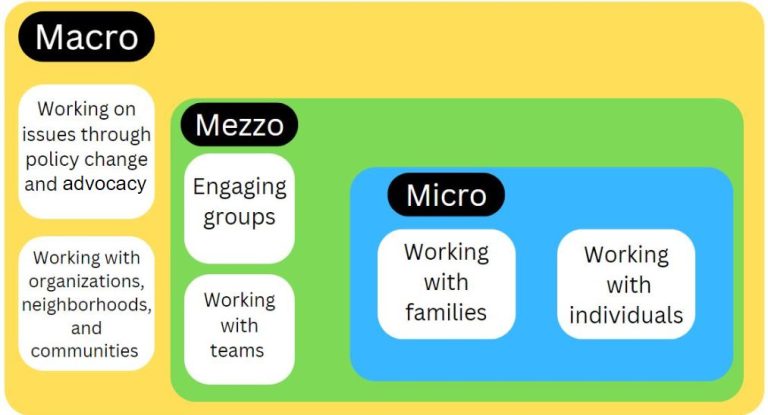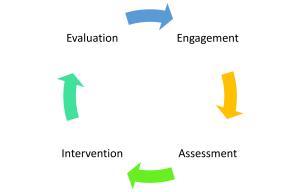1 Introduction to Community and Organizational Practice
“We are all going through a significant period of evolution, and it means, that there’s an opportunity in that, it feels burdensome right now, because so much has been taken from us. But there’s such an incredible opportunity, to decide how you want to show up in the new world.
Because it will be a new world. And my greatest hope is that we don’t reach for normal, that we reach for better.”
-Michelle Norris, Michelle Obama Podcast – August 2020
I cannot think of a more exciting or important time to develop community and organizational change skills than NOW. The issues are overwhelming and are very apparent to us; they are staring us down, impacting our day, increasing our stress, impacting our health, reducing our opportunities, and demanding our attention. At a time like this, which can easily be overwhelming and paralyzing, I tap into a deep reserve of hopefulness and macro practice skills to keep moving forward, persevere, and stay afloat. We need to implement formerly learned and known macro practice skills while at the same time exploring new ways of working in our communities and organizations.
The issues that we are facing have likely been in existence for a while and are only exacerbated by current conditions, which means that they need to be tackled with new energy, hope, and wisdom. If we tackle current complex problems with the same toolbox that has been used for decades, I am convinced we are going to fail. That is not an option right now—at least, it shouldn’t be an option.
So, macro practice focuses on the theories, skills, and practices that contribute to improving the lives in the community by focusing not on an individual, family, or group, but on the systems and organizations that can improve or hinder a community’s well-being.
Who should be engaged in community change work?
The importance of social workers engaging in macro practice is written into the professional mission which can be found in the preamble to the National Association of Social Work Code of Ethics:
The primary mission of the social work profession is to enhance human well-being and help meet the basic human needs of all people, with particular attention to the needs and empowerment of people who are vulnerable, oppressed, and living in poverty. A historic and defining feature of social work is the profession’s dual focus on individual well-being in a social context and the well-being of society. Fundamental to social work is attention to the environmental forces that create, contribute to, and address problems in living.[1]
The type of mission is not unique to social work. There are many other professions that focus on individual and societal health and well-being, requiring attention to macro issues in order to achieve the mission. Some of these are obvious, such as public health, but other professions such as education, environmental science, criminal justice, law, and business are working on issues in areas that are complex and systemic in nature.
Criticisms & challenges of ‘helping’ professions like social work
Despite a clear directive to focus on the individual and societal context, the profession of social work has long been challenged publicly as a profession of middle-class ‘stretcher-bearers’ who often contribute to the very problems and issues they intend to address (Alinsky, 1971[2]; Courtney and Strecht, 1994[3]). Are social workers looking too closely at individual needs rather than systemic causes of problems? Are we gazing and looking in the ‘right’ spaces?
Homan (2016) reminds us that we find it hard to ignore things once our eyes are open to them—but we need to do more than just look[4]. In order to support the systemic needs that children, families, neighborhoods, and organizations require, we need to have our eyes open to the multitude of factors that are likely to help them as well as hinder their well-being. We need to see the issues. We need to be willing to get uncomfortable—and often emotional. We need to consider culpability. What I want others to understand, however, is that this discomfort can be very empowering because it is also motivational.
Critical social work theorists such as Baines (2007)[5], Carroll and Minkler (2000)[6], and Nicotera and Kang (2009) are working to guide the profession toward effectiveness during a period of globalization and in a world that is increasingly interconnected. They argued that in order for the profession to fulfill its mission, it will need to move toward an increased commitment to social justice and transformation, requiring critical consciousness-raising versus contentment with the status quo (Baines, 2007; Nicotera & Kang, 2009).[7]
These criticisms stem from a place of hope and aspiration for what social work can and should be. I have always looked to these criticisms as a source of motivation. How can we liberate ourselves from the part of our profession or professional strategies that perpetuate inequality, continue to provide charity as a solution, harm families who are seeking help but can’t access it, or contribute to harmful overregulation of people’s lives?
What is macro practice?
‘Macro' is the term used to describe the large and systemic level on which we are going to focus, which is differentiated from a micro level of practice. As a social worker, if I were to engage in micro-practice, I would likely be referencing working with an individual, a child, and/or their family. The graphic shows a simplified explanation of macro practice as related to micro and mezzo practice levels.

Engaging in macro practice requires an in-depth understanding of systems theory which will be introduced in Chapter 6. In addition, we will explore the application of systems theory into systems thinking and design thinking; methods of understanding in-depth causes of complex problems as well as strategies for identifying optimal solutions.
Generalist skills applied to cacro practice
Community and organizational skills for macro practice in our case will follow the generalist social work practice steps (graphic 1.2). Whether or not you are entering the social work or another change-making profession, the language and steps should be understandable and relatable.
The graphic shows the cycle of generalist practice steps.

Together, we will be referencing these generalist steps as we embark on our journey of developing community and organizational change. As we do this, please keep at the forefront the issues that have motivated you to be a change-maker, a social worker, and a leader in the first place. You clearly are here, studying this material for a reason. You want to make a difference in your community and in the lives of others. So, keep a hold of that.
I am excited to be on this journey with you.
- National Association of Social Workers. (2021). Preamble to the code of ethics. Retrieved February 3, 2022, from https://www.socialworkers.org/About/Ethics/Code-of-Ethics ↵
- Alinsky, S. (1971). Rules for radicals. New York: Knopf Doubleday Publishing. ↵
- Courtney M., Specht, H. (1994). Unfaithful angels: How social work has abandoned its mission. New York: The Free Press. ↵
- Homan, M. (2016). Promoting community change: Making it happen in the real world. 6th edition. Boston, MA: Cengage Learning. ↵
- Baines, D. (Ed.). (2007). Doing anti-oppressive practice: Building transformative politicized social work. Black Point, Nova Scotia, Canada: Fernwood. ↵
- Carroll, J., & Minkler, M. (2000). Freire‘s message for social workers: Looking back, looking ahead. Journal of Community Practice, 8(1), 21-36. ↵
- Nicotera, N., & Kang, H. (2009). Beyond diversity courses: Strategies for integrating critical consciousness across social work curriculum. Journal of Teaching in Social Work, 29, 188-203. ↵
According to Merriam Webster Dictionary, 'macro' means on a large scale.
Differentiated from micro, which is on a small or individual scale.